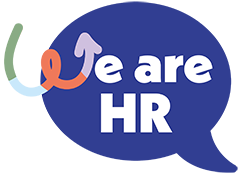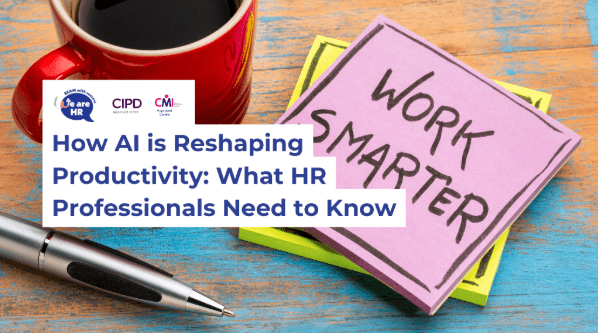Table Of Contents
- How AI is Reshaping Productivity: What HR Professionals Need to Know
- AI at Work: Opportunity or Overhype?
- The Research: What Employers Really Think
- Productivity, Efficiency – and a Few Red Flags
- What This Means for HR
- Building Trust: Policies, Transparency and Oversight
- Creating an AI-Ready Workforce
- Key Considerations for Ethical and Inclusive AI Use
- Final Thoughts: HR as the Driver of Responsible Innovation
- Ready to Lead the Future?
AI at Work: Opportunity or Overhype?
Artificial Intelligence (AI) is no longer a futuristic buzzword; it’s transforming how we work right now. From recruitment chatbots to predictive analytics, AI is reshaping everything from admin tasks to strategic decision-making. But how much of the hype actually translates into real workplace benefits?
This is the question tackled by a new piece of research commissioned by Acas and conducted by YouGov, which explores how employers in the UK view the impact of AI, especially when it comes to productivity.
The Research: What Employers Really Think
According to the study, over one in three employers (35%) believe AI will boost productivity in their organisation. This was the most commonly cited benefit of adopting AI technologies.
Other findings include:
- 12% of employers see AI as a way to gain a competitive edge
- 11% believe it will help increase workplace knowledge
- Another 11% say AI enables them to do more with fewer employees
- A further 11% remain unconvinced, saying they see no clear benefit at all
These mixed responses highlight a growing curiosity about AI’s potential, balanced by caution and uncertainty around how to implement it effectively.
Productivity, Efficiency – and a Few Red Flags
It’s no surprise that productivity topped the list of perceived AI benefits. Automating manual tasks, reducing time spent on paperwork, and generating quick insights can make a noticeable difference to organisational output.
However, there are red flags HR teams must take seriously. AI is not infallible. Its outputs can be:
- Inaccurate, especially if trained on flawed or biased data
- Tone-deaf, lacking human nuance in communication
- Opaque, with limited visibility into how conclusions are drawn
There’s also a risk of over-reliance. When used to replace rather than support human decision-making, AI can erode trust, damage employee morale, or reinforce inequality.
What This Means for HR
For HR professionals, AI represents both a strategic opportunity and a leadership challenge. Rather than waiting for tech teams or executives to lead the AI conversation, HR must take the initiative. This means not only understanding what AI can do but also ensuring it aligns with your organisation’s people strategy, values, and legal obligations.
Here’s what HR should focus on first:
Engage Early and Often
Involve employees, managers, and worker representatives early in discussions. AI changes how people work, and they deserve a voice in that process.
Create Clear AI Policies
Set expectations about:
- What AI tools are being used
- How they’re used in hiring, monitoring, or reviewing performance
- What oversight is in place to prevent misuse?
Transparency reassures staff and reduces resistance.
Keep Human Judgement Central
Even the most advanced AI shouldn’t replace human discretion in decisions affecting people. AI can support, not replace, human insight, empathy, and accountability.
Building Trust: Policies, Transparency and Oversight
Acas recommends that employers develop robust and transparent AI policies, making it clear how the technology is being integrated into roles and tasks. These policies should include:
- Purpose: What the AI system is used for
- Scope: Which roles, processes, or departments it affects
- Accountability: Who manages and audits the technology
- Oversight: How human checks are built into the process
AI use should be disclosed where appropriate, especially if it’s influencing job applications, scheduling, or performance evaluations. And crucially, employees should be able to challenge or question decisions that involve AI.
Creating an AI-Ready Workforce
Introducing AI doesn’t just require technology; it demands a culture of learning, adaptability, and trust. HR has a key role in helping teams prepare.
Here’s how HR can support this shift:
Raise Awareness
Offer short, accessible training that helps employees understand what AI is, how it works, and where it’s being used in your organisation.
Invest in Skills Development
As AI takes over routine tasks, demand will grow for soft skills, emotional intelligence, creativity, critical thinking, and communication. HR should embed these into training and development programmes.
Promote Digital Literacy
Support employees in learning how to use AI tools responsibly and effectively. Partnering with IT and L&D teams can ensure the right tools are introduced with the right guidance.
Reassure and Communicate
Change creates anxiety. Be clear that AI isn’t here to replace people but to help them do their jobs more effectively.
Key Considerations for Ethical and Inclusive AI Use
While the productivity gains of AI are real, they should never come at the cost of fairness, inclusion, or legal compliance.
HR must ensure:
- AI tools are bias-tested and regularly reviewed
- Decisions are explainable, especially in hiring or disciplinary actions
- Employees are informed about data usage in line with GDPR
- There’s equal access to training and tools, so no group is left behind
Inclusivity must be built into AI adoption from the start, not bolted on afterwards. This includes testing tools on diverse users and assessing impacts on underrepresented groups.
Final Thoughts: HR as the Driver of Responsible Innovation
AI’s influence on productivity and workplace culture is only set to grow. But its success depends on the people behind it, and that’s where HR comes in.
HR leaders and future professionals have an opportunity to steer the AI conversation with humanity, clarity and vision. With the right strategy, AI can enhance not just how we work—but also how we support, grow, and engage our people.
So while others may be waiting to see what AI does next, HR should be shaping what comes next—because the future of work is not just about technology. It’s about trust, transparency, and transformation.
Ready to Lead the Future?
At We-are-HR, we help you prepare for tomorrow’s workplace today. Whether you’re a seasoned professional or just starting out in your HR career, our CIPD and CMI-accredited qualifications offer the skills, knowledge and credibility you need to lead in a changing world.
Let us help you master the tools, trends and leadership mindsets that are reshaping HR.
📧 Email us at info@we-are-hr.com
📞 Call us on 020 3740 0757
🌐 Visit www.we-are-hr.com to explore our courses


